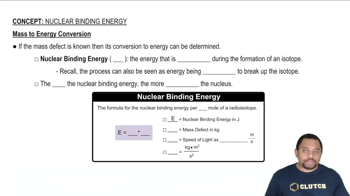Textbook Question
Rutherfordium-257 was synthesized by bombarding Cf-249 with C-12. Write the nuclear equation for this reaction.
572
views




Rutherfordium-257 was synthesized by bombarding Cf-249 with C-12. Write the nuclear equation for this reaction.
If 1.0 g of matter is converted to energy, how much energy is formed?
Calculate the mass defect and nuclear binding energy per nucleon of each nuclide. a. O-16 (atomic mass = 15.994915 amu) b. Ni-58 (atomic mass = 57.935346 amu) c. Xe-129 (atomic mass = 128.904780 amu)
Calculate the mass defect and nuclear binding energy per nucleon of each nuclide. a. Li-7 (atomic mass = 7.016003 amu)
Calculate the quantity of energy produced per gram of U-235 (atomic mass = 235.043922 amu) for the neutron-induced fission of U-235 to form Xe-144 (atomic mass = 143.9385 amu) and Sr-90 (atomic mass = 89.907738 amu) (discussed in Problem 57).